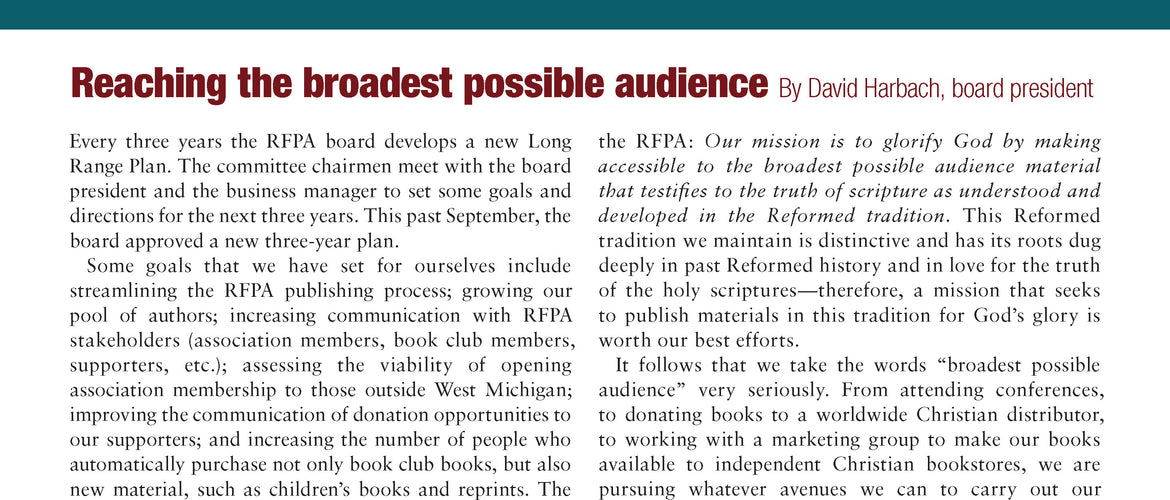We need your help!
By : Reformed Free Publishing Association
Dating Differently has been in print for six months, and you, our supporters, have been incredible in your response. We’ve had to go back to the printer for more copies.
We think it’s safe to say that you think this is a good book. Now we are asking you to help us spread the word. Has this book been a help to you in your Christian dating? Do you want to encourage others to date differently?
Please go to the book page on Amazon and leave a review for us. If you don’t have the book yet, you can get it here, and still leave a review.
Thank you for your continued support!
Read MoreBiblical, practical, God-focused, and Reformed
By : Reformed Free Publishing Association
A "captivating account of the history of Christ’s birth"
By : Reformed Free Publishing Association
The greatest miracle ever to take place was not the standing still of the sun over Joshua’s battle or water coming from the rock by the striking of Moses’ rod. The greatest miracle ever to take place was the incarnation of Almighty God, which took place when Jesus Christ was born many years ago of the virgin Mary. The magnitude of this miracle follows from its stunning implications: that the God who created the world around us, who formed each of us in the darkness of our mothers’ womb, who cannot be contained in temples made with human hands, assumed the form of a servant, took upon himself our human nature, was wrapped in swaddling clothes and laid to sleep in a manger! The preciousness of this miracle to every believer is found in God’s purpose in performing it. Jesus Christ, the Son of God incarnate, was not born to gratify our sentimentality during the holiday season. He was not born as the poster child for world peace to be displayed in nativity scenes across the nations. He was born for our salvation, which he would accomplish when he grew into the man who hung on the cross and was raised again three days later for our justification.
Read More"Heartily recommended to the reading public!"
By : Reformed Free Publishing Association
With delight this new book by author Martyn McGeown, missionary-pastor of the Limerick Reformed Fellowship, is heartily recommended to the reading public!
In this new publication the author addresses what by his own confession is “the greatest miracle in history”: the incarnation, birth, and childhood of our Lord and Savior Jesus Christ (1).
Read MoreThe Belgic: "A Confession of the Gospel in all its riches"
By : Reformed Free Publishing Association
The Belgic Confession: A Commentary, Volumes I–II by David J. Engelsma. Jenison, MI: Reformed Free Publishing Association, 2018–19. 348 and 382 pages. Reviewed by Dr. H. David Schuringa, a reformed theologian living in West Michigan (as reviewed in the July 24, 2019 issue of Christian Renewal).
The publishing of Dr. David Engelsma’s two-volume commentary on the Belgic Confession is a welcome event due not only to its meaty content but also to meager current resources. The historic confession comprises a complete dogmatics in its own right as it follows the usual outline of the loci with the doctrines of the Word, God, Christ, the Holy Spirit, Ecclesiology and Eschatology.
Engelsma maintains, however, that though the confession is doctrinal and systematic, it is not a systematic theology as such but rather, “the confession of the gospel in all its riches as this gospel is known by every illumined mind and embraced by every regenerated heart” (II:366f.). That is certainly true in large measure, which in turn makes these two volumes Engelsma’s own dogmatics of sorts. What Berkhof did for Bavinck, he does for Hoeksema.
Read More"Thoroughly covenantal, consistently biblical, and beautifully Christo-centric"
By : Reformed Free Publishing Association
Thoroughly covenantal, consistently biblical, and beautifully Christo-centric, Jehovah’s Mighty Acts chronologically highlights stories from Old Testament history for the elementary-aged child, explaining how each story displays a wonder of God’s grace toward his people. As a mother of several children falling in this age group, I especially appreciated Rev. Langerak’s accessible language and simple sentence structure, while at the same time maintaining the depth of spiritual truth contained in each biblical story. In fact, Jehovah’s Mighty Acts both encourages and instructs both the child listening and the adult reading aloud as well!
It is refreshing to use a Bible story book that doesn’t require the Reformed believer to weed out false interpretations or inaccurate accounts of biblical events. And though God has blessed the Reformed church with several lovely classic children’s Bible story books, a fresh recounting of these stories and a creative new format powerfully cements biblical history in our children’s minds anew.
Read MoreRFPA Update newsletter - Winter 2019
By : Reformed Free Publishing Association
IN THIS ISSUE:
- Reaching the broadest possible audience
- Theological Book Network
- "A teaching aid on the Canons"
- Gold star membership
- RFPA classics reprinted
- God's Everlasting Covenant of Grace published in Spanish
- Coming Soon! Jehovah's Mighty Acts
- Coming Soon! Letters from Katie Luther: A Novel
- Seeking donors
- His Mercy Endureth Forever reviews
- RAM conference
- Iron Sharpens Iron pastors' luncheon
Book Review: Walking in the Way of Love, volume 2
By : Reformed Free Publishing Association
Walking in the Way of Love: A Practical Commentary on 1 Corinthians for the Believer, volume 2, by Nathan J. Langerak. Jenison, MI: Reformed Free Publishing Association, 2019. 544 pages, hardcover. [Reviewed by Rev. Clayton Spronk]
Rare are the biblical commentaries that provide sound theological instruction. Rarer still are the commentaries that provide sound theological instruction and helpful application to the faith and life of the church today. Even a little of both of these oft-missing ingredients would be enough to recommend a commentary to serious students of scripture. That this volume offers a feast of accurate explanations of the truth of scripture and appropriate applications means that I must highly recommend it to the reader.
Read MoreBook Review: Grace and Assurance
By : Reformed Free Publishing Association
Grace and Assurance: The Message of the Canons of Dordt, by Martyn McGeown. Jenison, MI: Reformed Free Publishing Association, 2018. Hardcover. 384 pages. [Reviewed by Derrick Span, a member of Immanuel Protestant Reformed Church]
Rev. Martyn McGeown's book, entitled Grace and Assurance: The Message of the Canons of Dordt, emphasizes the necessity, as Reformed Christians, to thoroughly understand our creeds and confessions. These creeds and confessions exhibit what heresies our fathers fought against and what they clung to with ardent zeal. We might ask what value there is in reading a book about the Canons, or we might object that the Canons, Belgic Confession, and Heidelberg Catechism are only creeds. Should we be spending our time studying these old creeds and confessions when we have big enough problems understanding our Bible? Are we not supposed to hold to sola scriptura? While these areas of concern are essential, they express a misunderstanding that we cannot learn from those who came before us. We must be careful in speaking in that way. Instead, we ought to read and listen to those who fought for the truth, seeking the truth from them. By hearing them, we will be better equipped to read God’s word through an informed outlook. So I encourage the use of this book not just for informing us of what our fathers taught, but as a means to examine what we hold to and whether we maintain the understanding of God’s word. To encourage this mindset, a brief explanation of the book is necessary.
The author’s explanation of the Canons begins with the intent, namely to expose Arminianism as erroneous from the ground up. To accomplish this purpose, our fathers had to explain many different doctrines as clearly as possible to leave no room for Arminianism to stand. Where would they begin? Would they start with the main point that Arminian fought against, i.e., reprobation? As a reading of the Canons would illustrate, they did not begin with reprobation; in fact, they did not for some time. The Canons began with who God is and who man is in relation to God. McGeown and our forefathers teach us a crucial bit of wisdom by starting with God in their explanation.
Read MoreRFPA Update newsletter - Spring 2018
By : Reformed Free Publishing Association
Click icon to read the full pdf version. The articles in this issue are: "Richly blessed by those books" Keeping RFPA titles in print: Amazing Cross, Behold, He Cometh, Portraits of Faithful Saints Two special Reformation Issues of the Standard Bearer New Releases: Walking in the Way of Love, T is for Tree, Studies in Hebrews Children's books division news What are the next books being printed?: Here We Stand: Commemorating the 500th Anniversary of the Reformation, The Belgic Confession commentary (volume 1), Grace...
Read MoreThe Charge of Antinomianism (9): Dismissing it
By : Reformed Free Publishing Association
The charge of antinomianism coming from the quarters of the federal vision and its supporters must be rejected and dismissed, but also countered. It should hearten the Reformed church and believer that they have even drawn the charge. If men like Mark Jones, Richard Gaffin, and the rest of the federal vision men charge the truth with antinomianism and try to dismiss the truth with a name, they do to us Reformed believers nothing more than what the opponents of...
Read MoreThe Charge of Antinomianism (8): Assurance by Works
By : Reformed Free Publishing Association
The book by Mark Jones, purporting to be a tool to discover antinomianism in the preaching and teaching of ministers and in the faith of believers, turns out to be a full-blown attack on the doctrines of grace. This attack continues with his assault on the precious Reformed doctrine of assurance. Because the Reformed faith teaches that salvation is by grace alone through faith alone and not by works, it gives assurance and comfort to the child of God. Such is...
Read MoreGospel Truth of Justification (6): Polemical and Necessary
By : Reformed Free Publishing Association
Ending last time with the fact that the author of Gospel Truth of Justification both necessarily and properly engages in polemics, we now briefly consider the heresies refuted and contradicted.
God used the sixteenth-century Reformation to deliver his church from the deadly heresy of justification partly by faith in Christ and partly by the good works of the sinner. This heresy Rome vigorously maintains to this day. Not many years after the Reformation, the doctrine of justification by faith alone again came under attack by James Arminius and his followers. Originating within the Reformed churches and more subtle than the Romish corruption of justification, the Arminian position is “justification by work. The work is faith” (p. 10). Even worse,
“works of obedience to the law are not excluded from the Arminian doctrine of justification. As the Canons remark, the Arminian doctrine of justification is that God “regards faith itself and the obedience of faith” as the sinner’s righteousness. The “obedience of faith” is the good works that faith performs.
Therefore, justification for Arminianism is by works, with a vengeance. Arminianism’s doctrine is worse than Rome’s (p. 10).
The current threat to the doctrine of justification by faith alone in “conservative” Reformed churches is the federal vision, which bears the marks of both the Romish and Arminian subversion of justification. Federal vision theologians profess a “concern” for holiness. Their fear is antinomianism. Engelsma explains leading federal vision proponent Norman Shepherd’s solution:
Already in the preface of his book [The Call of Grace: How the Covenant Illuminates Salvation and Evangelism], Shepherd is wondering “where and how,” in light of the Reformed faith’s confession of salvation by grace, “does human responsibility enter in?” “Human responsibility” for Shepherd is conditions that humans must perform and upon which the covenant of God and its promises of salvation depend: “conditions were, indeed, attached to the fulfillment of the promises made to Abraham.” Only a conditional covenant with a conditional salvation can ward off the threatening evil of antinomianism. Only the preaching of a conditional covenant enables the Reformed preacher to “preach grace without being antinomian” (p. 431).
A conditional covenant means conditional justification. Writes Shepherd, “Faith, repentance, obedience, and perseverance are indispensable to the enjoyment of these blessings [of the new covenant]. They are conditions” (The Call of Grace, p. 50). Explaining Shepherd’s position, Engelsma writes,
Faith and its works are the condition fulfilled by the sinner in order to receive and retain his justification, because faith and its good works are the “condition to be met for the fulfillment of [the] promise [of the covenant]" (p. 277).
Engelsma views the federal vision as “the most serious assault on the gospel of justification probably since the time of the Reformation.” Adding to the seriousness of this threat is the fact that “the enemy is within. It appears, launches its attack, and is protected and defended within the Reformed and Presbyterian churches that have a reputation for orthodoxy, the Orthodox Presbyterian Church and the Presbyterian Church in America among others” (p. xiv). Elsewhere in the book, Engelsma identifies the United Reformed Churches who “have had advocates of the federal vision arise in their bosom without disciplining the heretics, indeed in at least one instance exonerating the federal visionist” (pp. 480, 481).
Read MoreThe Charge of Antinomianism (7): A Dangerous Distinction
By : Reformed Free Publishing Association
Distinctions must sometimes be made in theology. They are good and useful to understand and explain theological terms. For instance, the distinction between the will of God’s decree and the will of his command explains how God summons all men everywhere to repent and believe in the Lord Jesus Christ and promises to all who do that they will be saved, and at the same time God wills eternally the damnation of the reprobate who hear that preaching of Christ. The...
Read More












